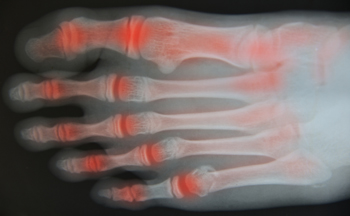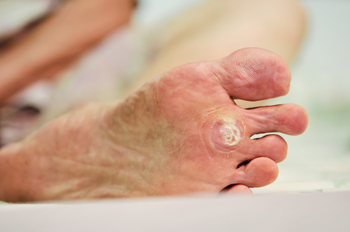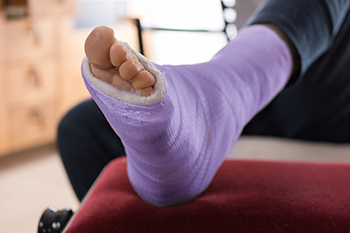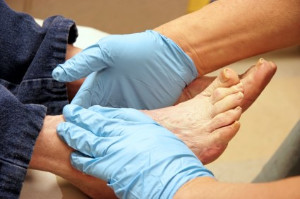January 2024
Are You Suffering From Ingrown Toenails?
Types and Symptoms of Foot Arthritis

Foot pain can be a common issue, often arising from various causes, such as sports activities, prolonged standing at work, or wearing ill-fitting shoes. It can range from minor discomfort to debilitating pain, and its roots can be diverse. Overuse, strain on tendons or ligaments, fractures, or arthritis are some of the contributing factors. Arthritis can significantly impact foot health. Osteoarthritis, or OA, the most common type, can affect the foot's 33 joints, leading to pain and misalignment. Rheumatoid arthritis, or RA, an autoimmune form, often starts in small hand and foot joints, causing pain and swelling. Psoriatic arthritis, or PsA, affects skin and joints, causing unique issues like dactylitis and plantar fasciitis. Gout, characterized by uric acid crystals, can cause sudden, intense pain, generally in the big toe. In systemic lupus erythematosus, or SLE, foot pain is often overlooked. Lupus-related arthritis, muscle, nerve, and soft tissue issues can lead to foot problems. Immunosuppressant medications increase the risk of complications, making proper footwear and podiatric care vital for lupus patients. If you have foot pain of any sort that is not a one-time issue, it is suggested that you schedule an appointment with a podiatrist for a proper diagnosis and treatment.
Arthritis can be a difficult condition to live with. If you are seeking treatment, contact one of our podiatrists from Bazzi Podiatry. Our doctors can provide the care you need to keep you pain-free and on your feet.
Arthritic Foot Care
Arthritis is a term that is commonly used to describe joint pain. The condition itself can occur to anyone of any age, race, or gender, and there are over 100 types of it. Nevertheless, arthritis is more commonly found in women compared to men, and it is also more prevalent in those who are overweight. The causes of arthritis vary depending on which type of arthritis you have. Osteoarthritis for example, is often caused by injury, while rheumatoid arthritis is caused by a misdirected immune system.
Symptoms
- Swelling
- Pain
- Stiffness
- Decreased Range of Motion
Arthritic symptoms range in severity, and they may come and go. Some symptoms stay the same for several years but could potentially get worse with time. Severe cases of arthritis can prevent its sufferers from performing daily activities and make walking difficult.
Risk Factors
- Occupation – Occupations requiring repetitive knee movements have been linked to osteoarthritis
- Obesity – Excess weight can contribute to osteoarthritis development
- Infection – Microbial agents can infect the joints and trigger arthritis
- Joint Injuries – Damage to joints may lead to osteoarthritis
- Age – Risk increases with age
- Gender –Most types are more common in women
- Genetics – Arthritis can be hereditary
If you suspect your arthritis is affecting your feet, it is crucial that you see a podiatrist immediately. Your doctor will be able to address your specific case and help you decide which treatment method is best for you.
If you have any questions, please feel free to contact one of our offices located in Detroit, West Detroit, Northwest Detroit, Sterling Heights, Hamtramck, Dearborn Heights, Madison Heights, Redford, and Livonia, MI . We offer the newest diagnostic and treatment technologies for all your foot care needs.
Symptoms and Treatment of Plantar Warts

Plantar warts, caused by the human papillomavirus, or HPV, are thick, rough skin growths found on the bottom of the foot. While they are benign, the discomfort they can cause is far from trivial. Plantar warts typically form on pressure points such as the heel or ball of the foot, entering the skin through cuts or scratches. Direct contact with an infected surface or person can also lead to their development. Treatment options include keratolytic therapy, cryotherapy, immunotherapy, and laser therapy. In severe cases, surgery is needed. Keratolytic therapy employs acid medication to thin the wart, prompting the outer skin layer's shedding. Cryotherapy involves freezing the wart with liquid nitrogen, creating a red blister that eventually leads to the wart's natural removal. Immunotherapy, using creams or shots, enhances your immune system to combat HPV and eliminate the wart. Laser therapy utilizes focused light to cut away the wart, while surgical removal, performed by numbing the skin and burning the area, becomes necessary in some cases to prevent recurrence. If you have been infected with plantar warts, it is suggested that you schedule an appointment with a podiatrist who can examine your foot and suggest the treatment option that is best for you.
Plantar warts can be very uncomfortable. If you need your feet checked, contact one of our podiatrists from Bazzi Podiatry. Our doctors will assist you with all of your foot and ankle needs.
About Plantar Warts
Plantar warts are the result of HPV, or human papillomavirus, getting into open wounds on the feet. They are mostly found on the heels or balls of the feet.
While plantar warts are generally harmless, those experiencing excessive pain or those suffering from diabetes or a compromised immune system require immediate medical care. Plantar warts are easily diagnosed, usually through scraping off a bit of rough skin or by getting a biopsy.
Symptoms
- Lesions on the bottom of your feet, usually rough and grainy
- Hard or thick callused spots
- Wart seeds, which are small clotted blood vessels that look like little black spots
- Pain, discomfort, or tenderness of your feet when walking or standing
Treatment
- Freezing
- Electric tool removal
- Laser Treatment
- Topical Creams (prescription only)
- Over-the-counter medications
To help prevent developing plantar warts, avoid walking barefoot over abrasive surfaces that can cause cuts or wounds for HPV to get into. Avoiding direct contact with other warts, as well as not picking or rubbing existing warts, can help prevent the further spread of plantar warts. However, if you think you have developed plantar warts, speak to your podiatrist. He or she can diagnose the warts on your feet and recommend the appropriate treatment options.
If you have any questions please feel free to contact one of our offices located in Detroit, West Detroit, Northwest Detroit, Sterling Heights, Hamtramck, Dearborn Heights, Madison Heights, Redford, and Livonia, MI . We offer the newest diagnostic and treatment technologies for all your foot and ankle needs.
How to Choose Shoes for Distance Running

Embarking on the journey of distance running necessitates a discerning choice in footwear, an essential companion for every stride. Wearing the right distance running shoes is one of the ways to avoid injuries. Designed with meticulous precision, distance running shoes are crafted to endure the relentless rhythm of long-haul runs. These shoes seamlessly blend support and cushioning, striking an equilibrium that cradles the foot through each mile. The robust yet lightweight construction becomes a symbiotic extension of the runner, mitigating impact and maximizing efficiency. Breathable materials envelop the foot, ensuring comfort and ventilation. The soles, engineered for durability, provide a reliable grip on the terrain beneath, enhancing stability and confidence. If you require additional information about the right type of shoe for your running needs, it is suggested that you consult a podiatrist.
You should always make sure your running shoes fit properly in order to avoid injury. For more information, contact one of our podiatrists from Bazzi Podiatry. Our doctors can provide the care you need to keep you pain-free and on your feet.
Choosing the Right Running Shoe for Your Foot Type
Improper shoe sizing can cause a myriad of problems for your feet. Shoes that don’t fit you properly can lead to muscular imbalances in your body, which can result in foot, knee, and hip injuries.
Tips for Finding the Right Running Shoe
- Make sure you have a thumb’s width of wiggle room between the end of your longest toe and the front of the shoe.
- There should be little to no slipping at the heel
- Don’t assume your size in one shoe brand will be your size in another
- Do not lace up your shoes too tightly
- Walk around in the store with your new shoes before you buy them
If you have any questions please feel free to contact our one of our offices located in Detroit, West Detroit, Northwest Detroit, Sterling Heights, Hamtramck, Dearborn Heights, Madison Heights, Redford, and Livonia, MI . We offer the newest diagnostic and treatment technologies for all your foot and ankle needs.
Treatment Options for Stress Fractures

Treatment options for stress fractures focus on promoting healing, managing pain, and preventing complications associated with these injuries. Stress fractures typically result from repetitive stress or overuse and require careful attention to facilitate recovery. Rest is a fundamental component, involving the reduction or avoidance of activities that led to the fracture, allowing the affected bone to heal without additional strain. In some cases, immobilization with the use of casts, braces, or walking boots may be necessary to support proper healing. Modifying weight-bearing activities can also alleviate stress on the fracture site, often requiring the use of crutches or assistive devices. Pain management strategies may involve medications to address discomfort and inflammation. Wearing custom orthotic devices or shoe inserts may offer better support and alignment for the affected area, reducing bone stress. Adjusting activity routines, incorporating appropriate warm-up and cool-down exercises, and avoiding excessive exertion are essential in preventing future stress fractures. A balanced diet with sufficient calcium and vitamin D supports bone health and healing. While surgery is rarely needed, it may be considered when conservative treatments prove ineffective at stabilizing the bone. If you have sustained a stress fracture in your feet or ankle, it is suggested that you schedule an appointment with a podiatrist for an evaluation and personalized treatment plan.
Activities where too much pressure is put on the feet can cause stress fractures. To learn more, contact one of our podiatrists from Bazzi Podiatry. Our doctors can provide the care you need to keep your pain free and on your feet.
Dealing with Stress Fractures of the Foot and Ankle
Stress fractures occur in the foot and ankle when muscles in these areas weaken from too much or too little use. The feet and ankles then lose support when walking or running from the impact of the ground. Since there is no protection, the bones receive the full impact of each step. Stress on the feet can cause cracks to form in the bones, thus creating stress fractures.
What Are Stress Fractures?
Stress fractures occur frequently in individuals whose daily activities cause great impact on the feet and ankles. Stress factors are most common among:
- Runners
- People affected with Osteoporosis
- Tennis or basketball players
- Gymnasts
- High impact workouts
Symptoms
Pain from the fractures occur in the area of the fractures and can be constant or intermittent. It will often cause sharp or dull pain with swelling and tenderness. Engaging in any kind of activity which involves high impact will aggravate pain.
If you have any questions please feel free to contact one of our offices located in Detroit, West Detroit, Northwest Detroit, Sterling Heights, Hamtramck, Dearborn Heights, Madison Heights, Redford, and Livonia, MI . We offer the newest diagnostic and treatment technologies for all your foot and ankle needs.
Recognizing Diabetes Symptoms in Feet

Diabetes, a chronic condition affecting millions, intricately weaves its effects into various facets of health, and the feet stand as a significant battleground. One prominent sign is peripheral neuropathy, where nerve damage leads to sensations of tingling, burning, or numbness. Reduced blood circulation, a common consequence of diabetes, may result in cold feet and slow wound healing. The development of foot ulcers, often painless, but potentially severe, underscores the impact of diabetes on the feet. Changes in skin texture and color, as well as the susceptibility to infections, are additional indicators. Individuals with diabetes must remain vigilant, as these symptoms can escalate into serious complications without prompt intervention. Regular foot inspections, proper hygiene, and seeking immediate medical attention for any abnormalities become crucial elements in managing diabetes-related foot concerns. If you have diabetes, it is strongly suggested that you are under the care of a podiatrist who can help you to manage this serious condition.
Diabetic foot care is important in preventing foot ailments such as ulcers. If you are suffering from diabetes or have any other concerns about your feet, contact one of our podiatrists from Bazzi Podiatry. Our doctors can provide the care you need to keep you pain-free and on your feet.
Diabetic Foot Care
Diabetes affects millions of people every year. The condition can damage blood vessels in many parts of the body, especially the feet. Because of this, taking care of your feet is essential if you have diabetes, and having a podiatrist help monitor your foot health is highly recommended.
The Importance of Caring for Your Feet
- Routinely inspect your feet for bruises or sores.
- Wear socks that fit your feet comfortably.
- Wear comfortable shoes that provide adequate support.
Patients with diabetes should have their doctor monitor their blood levels, as blood sugar levels play such a huge role in diabetic care. Monitoring these levels on a regular basis is highly advised.
It is always best to inform your healthcare professional of any concerns you may have regarding your feet, especially for diabetic patients. Early treatment and routine foot examinations are keys to maintaining proper health, especially because severe complications can arise if proper treatment is not applied.
If you have any questions please feel free to contact one of our offices located in Detroit, West Detroit, Northwest Detroit, Sterling Heights, Hamtramck, Dearborn Heights, Madison Heights, Redford, and Livonia, MI . We offer the newest diagnostic and treatment technologies for all your foot and ankle needs.





